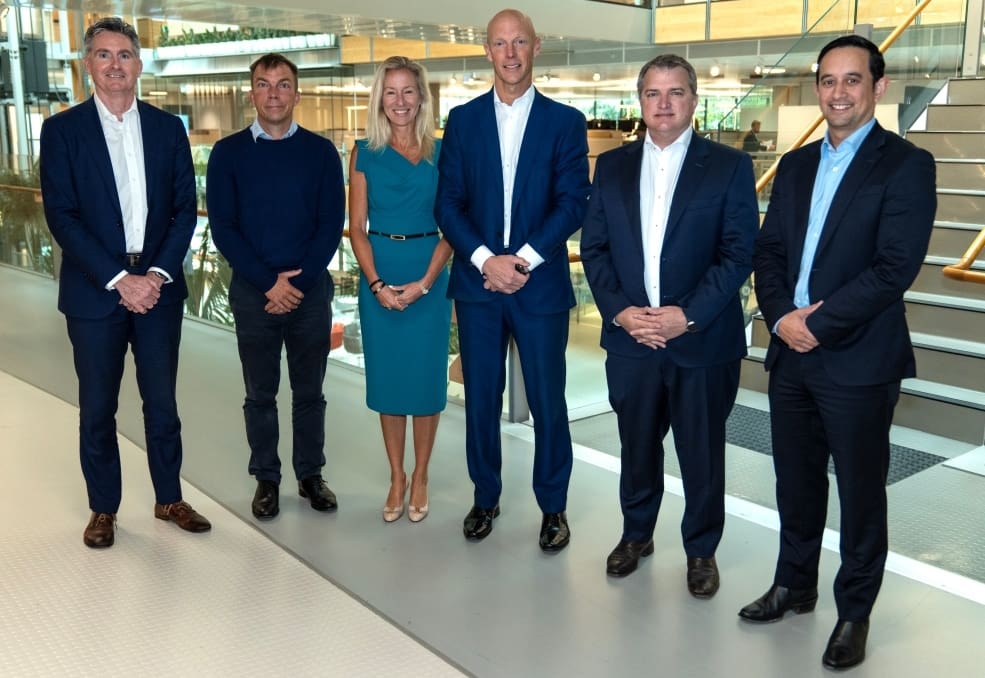
CBA executive director carbon Bart Thomson, CBA executive general manager commodities trade and carbon Alex Toone, CBA managing director global carbon markets Yasmina Elshafei, CBA group executive institutional banking and markets Andrew Hinchliff, RLF AgTech CEO Ken Hancock and Affinity Capital group managing director Adam Santa Maria.
AUSTRALIA’s Clean Energy Regulator has added RLF AgTech’s Hillston Soil Carbon Project to its Emissions Reduction Fund register of projects which can generate Australian Carbon Credit Units (ACCUs).
The project has been developed using RLF AgTech’s plant-nutrition products and proprietary system Accumulating Carbon in Soil System (ACSS) designed to drive the generation of cost-effective soil carbon credits.
The irrigated project involves 45ha located 12km south-east of Hillston in the Lower Lachlan Valley of southern New South Wales.
By building organic soil carbon levels to generate ACCUs, Hillston Carbon Project farmers Luke and Felicity Hutchinson are seeking to improve their cropping and grazing farm business and add an additional revenue stream.
This potential revenue stream will be in addition to the increased revenue expected from typical yield increases achieved by using the RLF AgTech products in the ACSS when compared to the use of traditional soil applied fertilisers alone.
“I first considered using RLF’s products due to the potential for emissions offsetting, and I’ve noticed additional benefits such as improved root health and increased soil biodiversity,” Mr Hutchison said.
RLF AgTech managing Director Ken Hancock said producing Australia’s fastest soil-carbon ACCU was a “bold and ambitious challenge” as the RLF AgTech teams looks at benefits that can be generated in the transition to a net zero carbon economy.
Independent carbon service consultancy Carbon West has been appointed to support the establishment and on-going compliance management of RLF’s numerous commercial farming soil carbon pilot programs.
As the first project approved by the CER using RLF’s ACSS, the project has been set up to demonstrate and drive rapid generation of soil carbon ACCUs through the use of RLF AgTech’s advanced crop nutrition products and technologies.
RLF AgTech’s Hillston Soil Carbon Project is seeking to generate soil carbon credits in 1-2 years, when typically it takes around 4-5 years for projects to begin generating ACCUs.
“The pivot irrigation system used in this project gives the ability to improve plant biomass production year-round, given that we are not at the mercy of rainfall variability,” RLF AgTech field advisor Richard Stone said.
“Irrigation also reduces the risk associated with drought that can impact the building and maintenance of soil carbon levels over time.
“In fact, the Hillston project area has access to water rights which currently exceed irrigation demand.”
Soil carbon sequestration is a key component of the Australian Government’s technology-led emissions reduction policy and has the potential to be a significant CO2 removal mechanism.
Demand for carbon credits domestically is expected to reach 40 million ACCUs under the Australian Federal Government’s Safeguard Mechanism by 2030.
Based in Perth, RLF AgTech is an ASX-listed company which develops products that combine plant science with advanced chemistry and manufacturing practices to produce high-quality plant nutrition products for commercial agriculture.
These products include RLF’s Plant Proton Delivery Technology which the company says enable farmers to grow higher-yielding, better-quality, and more nutritious produce while supporting the plants’ natural ability to store and reduce atmospheric carbon.
Alliance with CBA
Following on from a letter of intent provided to RLF AgTech in February last year, the Commonwealth Bank of Australia has entered into a broad strategic relationship with RLF Carbon to further explore opportunities for the development and generation of high-quality ACCUs.
RLF Carbon is launching a soil-carbon pilot program to demonstrate the efficacy of RLF’s innovative products and technologies at sequestering soil carbon at scale through its proprietary ACSS, for which a provisional patent has been filed.
The pilot program will span 5000ha of prime Australian farming land and represents a major step in the development of RLF AgTech’s strategy to monetise the generation of ACCUs at scale across Australia’s 23 million hectares of cropping country.
RLF AgTech’s ACSS will be used by pilot participants.
“The carbon pilot trials funded by CBA will allow us to realise our vision to utilise our proprietary technology to generate ACCUs, while also delivering agronomical benefits for farmers and contributing to Australia’s climate change strategy, where carbon credits are a core pillar,” Mr Hancock said.
“We are excited to be working with CBA and recognise the leading role they are playing in supporting innovative businesses which are focused on addressing the world’s climate change challenge.”
CBA group executive institutional banking and markets Andrew Hinchliff said CBA was committed to being a leader in the development of Australia’s carbon market, and helping more agribusinesses unlock opportunities to participate in decarbonising.
“Our clients tell us financing is the biggest barrier to mobilising carbon credit supply, with capex needed to support the development of emerging carbon sequestration methods and technologies,” Mr Hinchliff said.
“A thriving carbon market is a significant economic opportunity for Australia and will play a vital role in the path to net zero.
“We want to play a leadership role in the development of this market and we look forward to collaborating with other Australian innovators to support piloting and scaling carbon projects across the country.”
Since listing in April 2022, RLF AgTech has executed distribution agreements in The Philippines, Vietnam and Cambodia.
The company already has established operations and product distribution in Australia, China, Taiwan, Thailand and Turkey.
Source: RLF AgTech

HAVE YOUR SAY